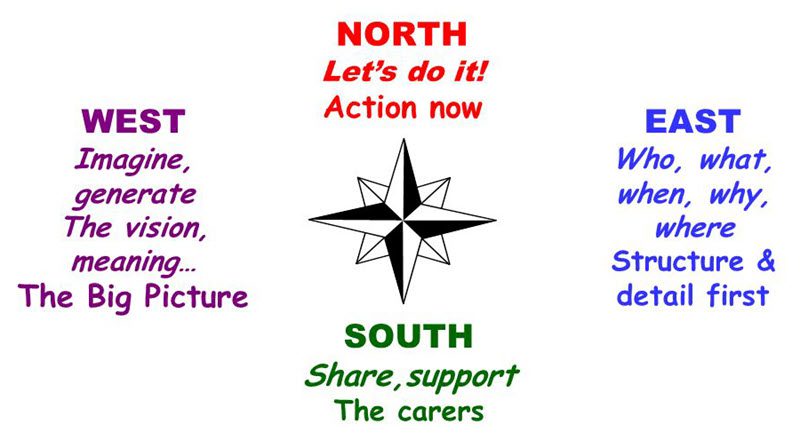What is the South Compass Personality Type?

The South Compass Personality Type is the “Natural Team Player” Style.
They like meeting with the team and will ask everyone’s thoughts and feelings before starting.
Southerners have superior patience and listening skills, highlighting their inclusive approach and hate conflict.
- Motto – Build the best team.
- Motivation – Helping.
- Priority – Values.
- Pace – Slow and laid-back.
- Strength – Cooperation.
- Weakness – Non-assertiveness.
- Aptitude – Peace-making.
- Work Style – Group.
- Main Work Competency – Team building.
- Image – Compassion.
- Pet Peeve – Conflict.
- Symbol – Sunshine.
Characteristics of a Southeast Personality Type
People who point to the northwest personality type move slowly, are good listeners, are conservative, tend to avoid change, are cautious, and follow the rules.
Characteristics of a Southwest Personality Type
People who identify with the Southwest personality type motivate others, are sociable, meet deadlines, are adaptable, avoid pressure, and enjoy relaxation.
South Personality Type cross-reference
- Keirsey Type – Artisans
- Temperament Type – Sanguine
- Animal Type – Golden Retriever
- DISC Type – Steadiness
- Socio-Communicative Type – Amiable
- True Colors – Orange
- Color Code – Yellow
- Occupational Type – Conventional
- Learning Type – Reflector
- Leadership Type – Accommodator
MBTI Personality Types (xSxP) – Sensing and Perceiving
Enneagram Types
- Type 2 – The Helper (ESFP, ISFP)
- Type 6 – The Loyalist (All Sensing)
- Type 7 – The Enthusiast (ESTP, ESFP)
- Type 9 – The Peacemaker (ISFP)
South Personality Type Careers
South-East job examples
- Human Resources – people person (S), organized (E)
- Nurse–caring (S), detailed (E)
- Mediator – peace-loving (S), structured (E)
- Receptionist – friendly (S), logical (E)
- Assistant Coach – team player (S), strategist (E)
South-West job examples
- Salesperson – likable (S), flexible (W)
- Diplomat – hospitable (S), adaptable (W)
- Missionary–giving (S), adventurous (W)
- Waiter – helpful (S), fast-paced (W)
- Talk Show Host – good listener (S), sense of humor (W)
What is the Personality Compass?
In 1998, Diane Turner and Thelma Greco developed the Personality Compass, “A New Way to Understand People.”
Although similar to the four core Personality Temperaments, the Personality Compass focuses more on how individuals interact with others and less on personality tendencies like introversion vs. extraversion.

Learn more about the Compass Personality Types.
Personality Temperaments, Traits, and Types
Personality Temperaments, Personality Traits, and Personality Types are used in Psychology to discuss a person’s Personality, a collection of Emotions, Perceptions, and Actions that interact with each other, regulate themselves, and shape a dynamic system that forms a person’s Behavioral Patterns.
Your inherited Traits (your Personality Temperament), along with your acquired Traits (such as education, socialization, and other various pressures and aspects in your life), form your Personality.
A Personality Type identifies a specific collection of Traits, both learned and natural, that comprise a broad, general Personality Classification—a way of labeling a collection of traits and behaviors.
A Personality Trait remains consistent and stable over time, which means you exhibit the same pattern across different situations and throughout your life.
Three criteria characterize Personality Traits: (1) consistency, (2) stability, and (3) individual differences. For example, if you are talkative at home, you also tend to be talkative at work. And if you were talkative at age 20, you would still be chatty at age 40.
Personality Temperament is your “Naturally Intuitive” biological Trait. These Traits are partly inherited from your genes and partially determined by your brainstem, which doesn’t change throughout your life. These are Natural Traits regarded as innate or inborn and not learned.
Your Personality Temperament is formed as an infant and is hard to modify, manipulate, or change because it is genetic. In some way or another, your inherited behavioral tendency will always be there.
Personality Traits are quantitative differences between people, and Personality Types are qualitative differences between people. The most crucial difference between the Trait Theory and the Type Theory is that the Type Theory views people’s characteristics as discrete categories. In contrast, the Trait Theory views these characteristics as a continuum.
For example, while a Type Theorist would claim that introverts and extraverts are two types of people, a Trait Theorist claims that extraversion is a gradient, and individuals can fall somewhere in the middle.
Your Temperaments, along with acquired Traits, form your Personality.

